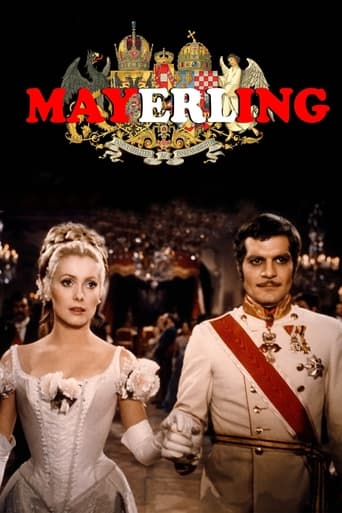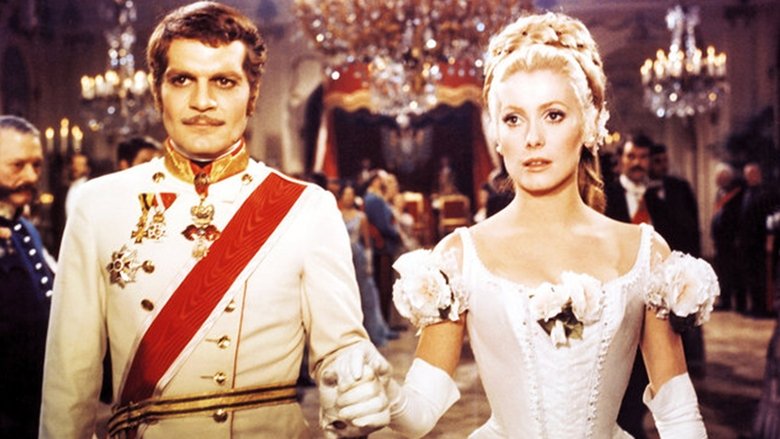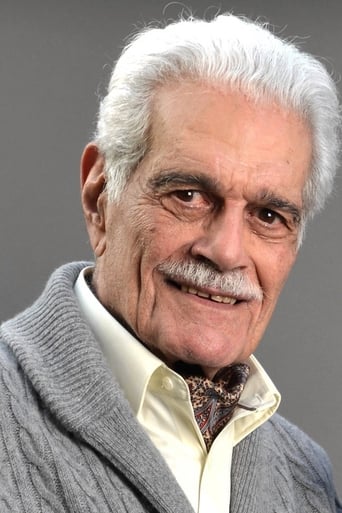

Mayerling (1969)
Crown Prince Rudolf of Austria clashes with his father, Emperor Franz Joseph I of Austria, over implementing progressive policies for their country. Rudolf soon feels he is a man born at the wrong time in a country that doesn't realize the need for social reform. The Prince of Wales, later to become Britain's King Edward VII, provides comic relief. Rudolf finds refuge from a loveless marriage with Princess Stéphanie by taking a mistress, Baroness Maria Vetsera. Their untimely demise at Mayerling, the imperial family's hunting lodge, is cloaked in mystery.
Watch Trailer
Cast


Reviews
"Mayerling" purports to be the story of Crown Prince Rudolf and his lover, the Baroness Vetsera, who died in a suicide pact at the Mayerling hunting lodge in 1889. It has an amazing international cast: Omar Sharif, Catherine Denueve, James Mason, Ava Gardner, Genevieve Page, and James Robertson Justice. Which just goes to show you that an all-star cast doesn't make a great movie. You need a script and some direction for that.In the '60s, these grand period pieces were all the rage. "Mayerling" is highly fictionalized, full of events that never took place. What actually happened at Mayerling is a mystery, so we'll never know about that. The unhappy Rudolf, left out of anything political by his father, drinks and womanizes. When he meets Maria Vetsera, she falls madly in love with him and (supposedly) he with her, but he is ordered by his father to end the affair. The two enter into a suicide pact at the family hunting lodge.Rudolf, in fact, is a weak man, and it allegedly took him six hours to shoot himself after killing Maria. But no one has any idea what went on - there have been stories of murder as well, and when Maria's body was stolen, when the body was identified, it was shown that she had died from a blow to her head and no gunshot wound was found.Director Terence Young has done some marvelous work, including Wait Until Dark, but something went amiss here. The film moves very slowly and is totally lacking in anything that would help the viewer invest in any of the characters. There are glorious production values and sex but a coldness about it. Sharif and Deneuve give stilted performances, and Mason and Gardner don't have much to do. James Robertson Justice and Genevieve Page are very good.On a side note, Gardner plays Rudolph's mother, "Sisi," who to this day is the Princess Diana of Austria. She's everywhere, and a popular subject of musicals and films targeted to European audiences.
History is so full of questions - what if such and such occurred, or if so and so had lived and not died, or if the weather had not been so bad on the date in question. There are all over the place, and Franklin Roosevelt dismissed this as "iffy" history. But people have hopes, dreams, and imaginations. Sometimes these run away with them.On January 30, 1889 Crown Prince Rudolf Von Hapsburg of the Austro-Hungarian Empire was in his hunting lodge at Mayerling with his mistress Baroness Marie Vetsera. Rudolf was married to Stephanie, sister of King Leopold II of Belgium. They had a daughter, but were unable to have other children - such as a male child (Austria had a male only rule about its Emperors since the death of Maria Theresa, a co-ruler with her husband and later her son in the 18th Century). Rudolf therefore did not care about how his open affair with the Baroness affected his despised wife. However, the Vetseras were nouveau rich minor aristocracy, and it displeased the Emperor Franz Josef and the Empress Elisabeth ("Sisi"). The Emperor and his Prime Minister, Count Taafe, also wanted Rudolf to be more active in pursuing his regular duties at court and in the empire.Rudolf was considered more liberal than the Emperor by many people. He may have been approached about taking the leadership of a separation movement from Hungary as potential King, but if he did nothing came of it.That January day a shot rang out in the middle of the night. Some equerries ran to Rudolf's room but he answered the door and said nothing was wrong. Then, about six hours later, a second shot rang out. This time Rudolf was found with the top of his head blown off. Marie was dead from a shot in the skull too, but she was on her bed. Mayerling (it helps that the scene of the tragedy sounds poetic) has been the subject of several films and television shows and many books. This writer uses the name as his nom-de-plume on another website. There is a fascination with that tragedy - one can see it as that of two young people who died rather than give each other up due to a demanding father. One can see it as the end of the hopes of liberalism in the old Austro-Hungarian Emprire. One even has a sense of the richness of the royal families of Europe in 1889 by the setting in that lodge. It is open to so many interpretations or feelings.The 1936 film with Danielle Darrieux and Charles Boyer is the better version, but this 1968 version with Catherine Deneuve and Omar Sharif is actually quite good. It takes the view that Rudolf was a potential reformer and liberal, and that the reactionaries spurred on the events that led to the deaths. Franz Josef (James Mason) is shown hand-in-glove with the reactionaries (even screaming about Rudolf's friendliness with Jews), and not sympathetic about the need his son might have for Maria's companionship (given the really unlikeable Stephanie). Rudolf tries to make a deal - as an inspector general for the army checking out army weaponry and maneuvers. But nobody pays attention to him. The result is a total collapse of spirit leading to his suicide pact.He does try to escape with Maria. Bertie, Prince of Wales (James Robertson Justice) is visiting - can Rudolf and Maria flee to England for diplomatic immunity? But Bertie knows the drill - when you are finished enjoying yourself go back home to the wife and mother (Alexandra and Victoria). He also knows that the brouhaha of giving shelter to Rudolf and his mistress would not sit well with Lord Salisbury's government, or the government of Germany (Austria's ally) under Otto Von Bismarck.So the film ends with that final suicide, although to enhance the romance the dying Rudolf grabs the hand of his dead lover as a last snub at his father.Was it like that? My romantic side wishes it was. But the evidence shows Rudolf was a weakling, who played with liberalism but really did not believe in it. Franz Josef (a hard working monarch, with his own side-friendship with actress Katherine Schratt) always mourned his wayward son, but he was ashamed of Rudolf's cowardice - what always bothered the old emperor was that Rudolf took six hours to turn his pistol on himself after shooting Maria. He could not make up his mind of doing the honorable thing (completing the suicide pact) or fleeing. Rudolf was a coward to the end.
Reading about the Crown Prince character in THE ILLUSIONIST, I discovered he was based on a real-life individual who became the basis for not one but two movie versions, both called MAYERLING. This revelation immediately brought back memories of this lushly filmed love story from 1968, a richly detailed costume drama starring Omar "Dr. Zhivago" Sharif and the beautiful but incredibly icy Catherine Deneuve. The story ends in horrible tragedy, which is also based on real events. Clearly, the filmmakers of this 1968 version of the tale were trying to recreate the huge success of David Lean's 1965 masterpiece "Dr. Zhivago." In this, they failed utterly. You may shed tears by the end, but you also will discover a film that lacks the heart of the film it attempted to emulate. It is easy to state that Deneuve was the wrong choice to play the love interest, and it is a no-brainer to see that director Terence Young, best known for early James Bond films, will never be mistaken for David Lean. It's like comparing Steven Spielberg to Stanley Kubrick. It can't be done.
Everyone agrees with this movie's virtues: its sets, costumes, and recreation of the era--all of which are impressively gorgeous. Kenneth Brannagh mentions that the look of the this film version influenced the setting/production design for his version of HAMLET (check out his audio commentary of the DVD, chap. 19). So MAYERLING has had its influence. And, yes, quite a few of us recognize its shortcomings. Frankly, it doesn't possess the passion/romance one expects. Perhaps both Sharif and Deneuve are too intelligent to be believable for a romantic suicide, but whatever it is, somehow the oomph one hopes for is missing. Nevertheless, it's still fascinating, and while not as involving as the Boyer version, it's got more historical detail and background.And yes it's worth comparing/contrasting with THE ILLUSIONIST.




